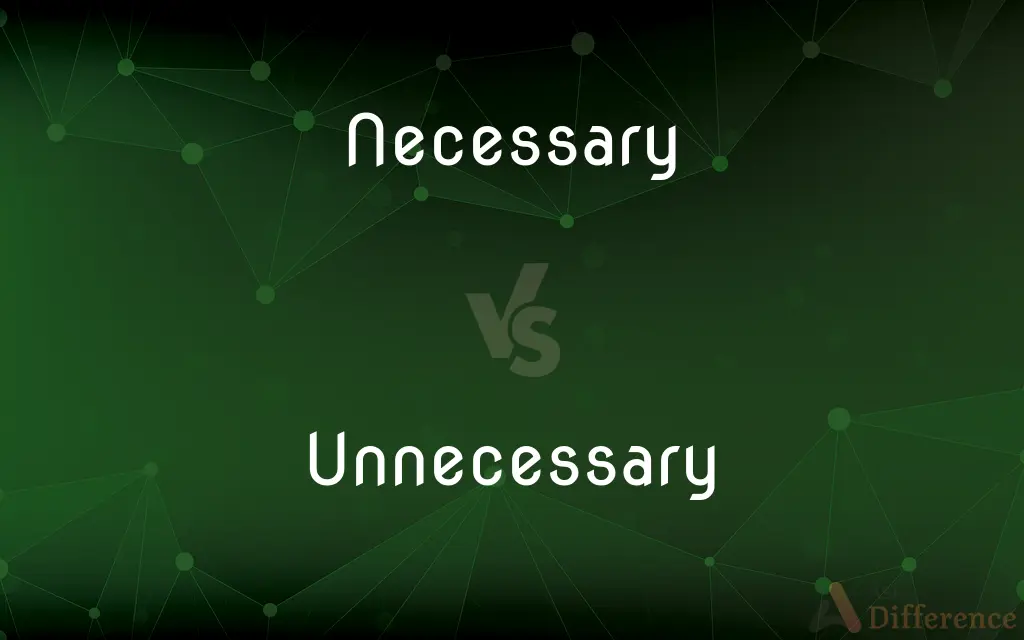Necessary vs. Unnecessary — What's the Difference?
Edited by Tayyaba Rehman — By Fiza Rafique — Updated on March 19, 2024
Necessary implies essential or required, while unnecessary means not needed or superfluous.

Difference Between Necessary and Unnecessary
Table of Contents
ADVERTISEMENT
Key Differences
Necessary actions or items are those deemed essential for achieving a particular goal or maintaining a certain standard, such as wearing a helmet for safety while biking. In contrast, unnecessary things are not needed to achieve a goal or may be considered excess, like decorations on a helmet that don’t contribute to safety.
While necessary tasks are often prioritized due to their importance in accomplishing objectives or fulfilling needs, unnecessary tasks might be postponed or skipped entirely, highlighting a clear distinction in priority based on utility and relevance.
In decision-making, determining what is necessary involves evaluating the importance and impact of an action or item on the desired outcome. Conversely, identifying something as unnecessary often results from recognizing that its absence would not hinder the achievement of a goal.
The concept of necessity can vary greatly depending on context, culture, and individual perspective, what one person considers essential, another may find superfluous. Meanwhile, the label of unnecessary often implies a universal lack of requirement, although this too can be subjective.
Economically, necessary expenditures are those allocated towards essentials such as food, shelter, and healthcare, reflecting a requirement for basic survival and well-being. Unnecessary spending, however, refers to purchases made beyond what is essential, often categorized as luxury or discretionary spending.
ADVERTISEMENT
Comparison Chart
Definition
Required or essential for a specific purpose or result.
Not needed, excessive, or irrelevant to the task at hand.
Importance
High, often indispensable for achieving a goal.
Low, may be omitted without impacting the outcome.
Context
Depends on goals, standards, or needs.
Often considered in relation to surplus or luxury.
Decision-Making
Involves evaluating essential impact on outcomes.
Recognizing the absence won’t hinder achieving a goal.
Variability
Can vary by context and perspective.
Generally viewed as lacking a requirement, but subjective.
Compare with Definitions
Necessary
Refers to spending on essentials.
Budgeting for necessary expenses is crucial in financial planning.
Unnecessary
Relates to spending on non-essential items.
Cutting back on unnecessary expenses can help save money.
Necessary
Essential or required to achieve a certain outcome.
Drinking water is necessary for survival.
Unnecessary
Not needed or beyond what is required for a specific purpose.
Decorative elements on functional items are often unnecessary.
Necessary
Tasks or items deemed necessary are usually prioritized.
In emergency situations, finding shelter is necessary before other tasks.
Unnecessary
Often associated with luxury or discretionary spending.
A luxury car is considered an unnecessary expense by many.
Necessary
What is necessary can vary greatly depending on the situation.
A compass is necessary for navigation in the wilderness.
Unnecessary
Its absence does not negatively affect the outcome.
Skipping a decorative garnish on a dish is unnecessary for its taste.
Necessary
May be viewed differently by individuals based on personal values or needs.
For some, having an internet connection is necessary for work.
Unnecessary
What is considered unnecessary can vary widely among individuals.
Some view streaming services as unnecessary, while others see them as essential entertainment.
Necessary
Needed or required
A contract complete with the necessary signatures.
Conditions necessary to life.
Unnecessary
Not needed
Some people feel that holiday insurance is unnecessary
Necessary
Unavoidably determined by prior conditions or circumstances; inevitable
The necessary results of overindulgence.
Unnecessary
Unnecessary things
Flora never wasted cash on unnecessaries
Necessary
Logically inevitable
A necessary conclusion.
Unnecessary
Not necessary; needless.
Necessary
Required by obligation, compulsion, or convention
Made the necessary apologies.
Unnecessary
Not needed or necessary.
The automatic child-frightener made clowns unnecessary.
Necessary
Something indispensable.
Unnecessary
Done in addition to requirements; unrequired.
Necessary
Required, essential, whether logically inescapable or needed in order to achieve a desired result or avoid some penalty.
Although I wished to think that all was false, it was yet necessary that I, who thus thought, must in some sense exist.
It is absolutely necessary that you call and confirm your appointment.
Unnecessary
Not necessary; not required under the circumstances; unless; needless; as, unnecessary labor, care, or rigor.
Necessary
Unavoidable, inevitable.
If it is absolutely necessary to use public computers, you should plan ahead and forward your e-mail to a temporary, disposable account.
Unnecessary
Not necessary
Necessary
(obsolete) Determined, involuntary: acting from compulsion rather than free will.
Necessary
A place to do the "necessary" business of urination and defecation: an outhouse or lavatory.
Necessary
(obsolete) Necessity.
Necessary
Such as must be; impossible to be otherwise; not to be avoided; inevitable.
Death, a necessary end,Will come when it will come.
Necessary
Impossible to be otherwise, or to be dispensed with, without preventing the attainment of a desired result; indispensable; requisite; essential.
A certain kind of temper is necessary to the pleasure and quiet of our minds.
Necessary
Acting from necessity or compulsion; involuntary; - opposed to free; as, whether man is a necessary or a free agent is a question much discussed.
Necessary
A thing that is necessary or indispensable to some purpose; something that one can not do without; a requisite; an essential; - used chiefly in the plural; as, the necessaries of life.
Necessary
A privy; a water-closet.
Necessary
Such things, in respect to infants, lunatics, and married women, as are requisite for support suitable to station.
Necessary
Anything indispensable;
Food and shelter are necessities of life
The essentials of the good life
Allow farmers to buy their requirements under favorable conditions
A place where the requisites of water fuel and fodder can be obtained
Necessary
Absolutely essential
Necessary
Unavoidably determined by prior circumstances;
The necessary consequences of one's actions
Common Curiosities
How do you determine if something is necessary?
Assess its essentiality for achieving a goal or fulfilling a need; if it’s indispensable or significantly impacts the outcome, it’s necessary.
Are unnecessary items always frivolous?
Not necessarily; something unnecessary for achieving a specific goal can still provide value, enjoyment, or aesthetic pleasure.
Can the status of an item or action change from unnecessary to necessary?
Yes, changes in circumstances, goals, or information can shift something from being unnecessary to necessary.
Why is it important to distinguish between necessary and unnecessary?
It helps in prioritizing tasks and allocating resources efficiently, especially in decision-making and budgeting.
How does culture influence what is considered necessary?
Cultural values and norms can dictate what is essential for living, influencing perceptions of necessity.
Can something be necessary for one person and unnecessary for another?
Yes, necessity is often subjective, depending on individual goals, values, and circumstances.
Is it possible for something to be both necessary and unnecessary?
In different contexts or to different people, yes. An item could be necessary for one purpose but unnecessary for another.
Can minimizing unnecessary actions or items improve quality of life?
Yes, focusing on what is truly necessary can simplify life, reduce stress, and lead to better financial health.
How can one reduce unnecessary expenses?
By critically evaluating spending habits, distinguishing wants from needs, and prioritizing expenditures that align with personal goals and financial stability.
How do economic conditions affect perceptions of necessity?
Economic conditions can shift priorities, making certain items or actions more or less necessary depending on financial constraints.
Can the concept of necessary vs. unnecessary apply to relationships?
In the context of personal growth and well-being, evaluating relationships based on their positivity and supportiveness can distinguish between those that are necessary and those that may be unnecessary.
Is it important to regularly review what we consider necessary?
Regularly reassessing necessities can help align with current goals, values, and financial situations, ensuring efficient resource use.
How do businesses determine necessary expenditures?
Through cost-benefit analysis and strategic planning to ensure spending aligns with core operational needs and growth objectives.
Does technology affect what is considered necessary?
Absolutely, advancements in technology can create new necessities, such as smartphones for communication in today's society.
Can environmental concerns make something unnecessary?
Yes, environmental sustainability can reframe certain practices or products as unnecessary due to their ecological impact.
Share Your Discovery

Previous Comparison
Loft vs. Penthouse
Next Comparison
Heavy vs. FatAuthor Spotlight
Written by
Fiza RafiqueFiza Rafique is a skilled content writer at AskDifference.com, where she meticulously refines and enhances written pieces. Drawing from her vast editorial expertise, Fiza ensures clarity, accuracy, and precision in every article. Passionate about language, she continually seeks to elevate the quality of content for readers worldwide.
Edited by
Tayyaba RehmanTayyaba Rehman is a distinguished writer, currently serving as a primary contributor to askdifference.com. As a researcher in semantics and etymology, Tayyaba's passion for the complexity of languages and their distinctions has found a perfect home on the platform. Tayyaba delves into the intricacies of language, distinguishing between commonly confused words and phrases, thereby providing clarity for readers worldwide.















































